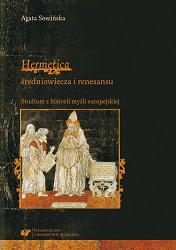Hermetica średniowiecza i renesansu. Studium z historii myśli europejskiej
“Hermetica” of the Middle Ages and of the Renaissance. A contribution to the study of the history of European thought
Author(s): Agata Sowińska
Subject(s): Language and Literature Studies, Studies of Literature, Middle Ages, Polish Literature, 16th Century, Philology
Published by: Wydawnictwo Uniwersytetu Śląskiego
Keywords: Hermetica; the Middle Ages; the Renaissance; Bernard z Lublina; Jakub Górski
Summary/Abstract: The work is devoted to the reception of hermetic literature in the Middle Ages and in the Renaissance in the works of Polish writers and it supplements the knowledge which was heretofore acquired in the field of the history of hermetic literature. The work focuses on two primary texts: a collection of dialogues entitled “Corpus Hermeticum” (in Marsilio Ficino’s Latin translation) and on a Latin treatise entitled “Asclepius”. The purpose of the work is to present a content-related and comparative analysis of works which contain quotations drawn from the aforementioned hermetic texts which are featured in: Bernard z Lublina (the so-called Philosophical Anthology), Jan z Trzciany (“De natura ac dignitate hominis”) and Jakub Górski (“Ad Magnificum Dominvm Stanislavm Miskovski Castellanvm Sendomiriensem et Capitanevm Cracoviensem Iacobi Gorscij Mercvrius sive de Trinitate contra Gregorium Bresinensem”), i.e. the figures who were mentioned only by Jan Czerkawski – a researcher of hermetism. The basis of the work is constituted by a manuscript of Bernard z Lublina which contains Latin excerpts from two most important hermetic texts: “Asclepius” and “Corpus Hermeticum”. The division is consistent with the division of the texts in the anthology of Bernard z Lublina: the first part comprises a content-based and comparative analysis of the excerpts from the treatise entitled “Asclepius”, the second part is devoted to the fourteen dialogues from the collection entitled “Corpus Hermeticum”. The study of the content of the anthology with reference to a comparison with the texts of other authors is supposed to bring about the separation of a tertium comparationis – a possible common strand of thought which reveals itself from an analysis and a comparison of the particular works. The analysis is supplemented by appendices which are devoted to works which heretofore have not received treatment: the works of Bernard z Lublina (in the form of tables which present the Latin, Greek and Coptic equivalent of the excerpts) and the works of Górski (in the form of an edition of the text).
Series: Historia
- E-ISBN-13: 978-83-226-3361-8
- Print-ISBN-13: 978-83-226-3360-1
- Page Count: 304
- Publication Year: 2018
- Language: Polish
- eBook-PDF
- Table of Content
- Introduction

